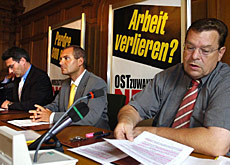Finance minister lobbies Swiss abroad

For the first time ever, a Swiss cabinet minister has travelled outside of the country to lobby Swiss citizens abroad ahead of a crucial national vote.
Finance Minister Hans-Rudolf Merz presented in Munich on Friday the government’s position on extending the Swiss labour market to citizens of new EU member states.
“Greek specialities in the beer garden” says the sign outside Munich’s Swiss House. Inside, Hans-Rudolf Merz is trying to convince his audience that Switzerland must vote “yes” on September 25.
“You know yourselves that free movement means freedom for workers,” he said during his speech.
Merz himself spent many years outside of Switzerland before beginning his political career. In those days, he was in close contact with Swiss communities in Africa and South America.
“I always wanted to know what was going on back home,” he told swissinfo. “We were able to exchange information.”
The room where Merz gave his speech was packed out by the Swiss abroad, with the overflow spilling out into the beer garden.
“In some Swiss towns, I get to speak in front of less people,” admitted the finance minister, who said later that free movement of labour was a chance for the younger generation.
“They will have more job opportunities,” he said. “Access to higher education outside Switzerland will be simplified.”
Economic benefits
Merz added the economy had everything to gain from a “yes” vote, so as long as it concentrated on doing business and avoided fighting with bureaucracy.
Free movement of workers, he said, “would allow Swiss companies to send their employees to their subsidiaries anywhere in Europe and call on workers from abroad when they need them.”
The finance minister also pointed out that the ten new EU member states represented of potential market of 75 million consumers.
“Markets in eastern Europe are interesting for Swiss firms who want to invest,” he said. “Creating subsidiaries abroad and hiring people doesn’t mean jobs will be lost in Switzerland.”
He added that by keeping the labour market closed to some countries, Swiss exporters could lose business and jobs would be threatened.
Merz also reminded his audience that the extension of the labour accord to the new EU member states was the direct result of Swiss voters accepting a first set of bilateral accords with the Union in 2000.
He said voters had to decide on September 25 if they were “prepared to treat Estonia the same as Luxembourg, Hungary the same as Spain,” adding that if would be unfair to differentiate between EU members.
swissinfo, Andreas Keiser in Munich
The Swiss will vote on September 25 on whether to extend a free movment of labour accord with the European Union to ten new EU member states.
Finance Minister Merz spoke for the first time to the Swiss abroad about this vote in Munich.
It was the first time a Swiss cabinet minister had made such a move.
Around 70,000 Swiss live in Germany.

In compliance with the JTI standards
More: SWI swissinfo.ch certified by the Journalism Trust Initiative











You can find an overview of ongoing debates with our journalists here . Please join us!
If you want to start a conversation about a topic raised in this article or want to report factual errors, email us at english@swissinfo.ch.